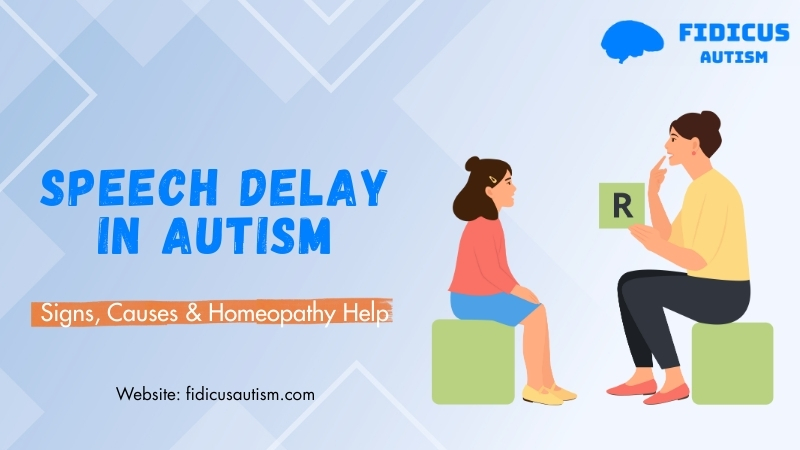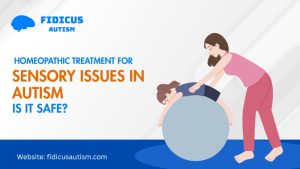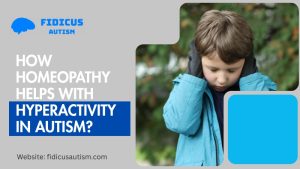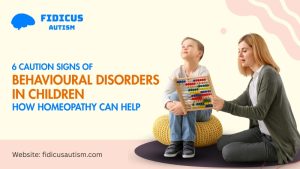Speech delay is one of the most common challenges faced by children with autism, often affecting their ability to express needs, emotions, and thoughts effectively. In autism, speech delay can range from mild language difficulties to complete absence of verbal communication, depending on the severity and individual developmental patterns. Unlike typical speech delays, autism-related communication issues are often linked to differences in social interaction, sensory processing, and brain function, making early identification essential for better outcomes.
The topic covers the connection between speech delay and autism, highlighting key causes, early signs, and how they differ from general speech delays. It also explains how homeopathy treatment for autism can support natural speech development by improving overall brain function, reducing sensory overload, and enhancing focus. With timely intervention and a personalized homeopathic approach, many children can make significant progress in their speech and language abilities.
What Are Speech or Language Delays?
A speech delay means a child is not developing speech sounds or pronunciation at the expected pace for their age. This includes difficulty with articulation (making sounds), fluency (smooth speech), and voice quality.
A language delay affects how a child understands and uses words—covering vocabulary, sentence formation, following directions, and storytelling.
Autism and speech delay often overlap. In autism, speech delays are not only about pronunciation but also about the social use of language (pragmatics). For example:
- The child might speak but not use language to share attention or emotions.
- They might repeat words (echolalia) instead of creating original sentences.
- They may prefer routines in conversation or avoid back-and-forth exchanges.
Speech delay vs autism:
- Speech Delay Alone: The child may have clear social engagement—good eye contact, gestures, and understanding—but struggles to produce or pronounce words.
Speech Delay with Autism: Social communication differences are present alongside speech issues—reduced shared attention, limited gestures, or preference for solitary play.

What Are the Symptoms of a Speech Delay?
Recognizing speech delay symptoms early can make a big difference in your child’s communication progress. While every child develops at their own pace, certain signs should prompt a closer look. Early detection allows for timely speech delay treatment and better long-term outcomes. Below is a detailed, age-wise guide to what you might notice:
By 12 Months
- No babbling with varied sounds (e.g., “ma-ba,” “da-ga”)
By one year, babies typically experiment with a variety of consonant and vowel sounds. Lack of babbling may indicate delayed speech development. - Minimal gestures such as pointing, waving, clapping
Gestures are a natural bridge to spoken words. When a baby doesn’t use them, it can slow language learning. - Doesn’t respond consistently to their name
While occasional distraction is normal, repeated lack of response could be an early sign of a hearing issue or autism and speech delay.
By 18 Months
- Vocabulary less than 10–20 words
These may include familiar names, simple objects, or action words. If your child speaks far fewer, it’s worth seeking advice. - Uses gestures more than words to communicate
While gestures are helpful, children at this age should be using some spoken words alongside them. - Rarely imitates sounds or words
Mimicking sounds is how children practice and learn speech patterns.
By 24 Months
- Fewer than 50 words or not combining words into short phrases (“go park,” “want milk”)
Most two-year-olds should be starting to form two-word phrases to express needs and ideas. - Speech hard to understand, even for parents
Some mispronunciations are normal, but if even familiar listeners struggle often, it’s a sign to evaluate. - Doesn’t follow simple commands (“bring cup,” “come here”)
This can indicate a receptive language delay or difficulty understanding spoken language.
By 36 Months
- Speech mostly unclear to strangers
By three years, children should be understood by unfamiliar adults about 75% of the time. - Sentences are short and incomplete
While grammar will still be developing, there should be a clear ability to link three or more words together. - Struggles to answer simple questions (“What’s your name?” or “Where’s the ball?”)
Difficulty with basic Q&A may point to a broader language delay.
Autism-Linked Red Flags
In speech delay vs autism, these social-communication signs may suggest the delay is part of autism spectrum differences:
- Little or no eye contact during communication
Avoidance or reduced use of eye contact can affect social language learning. - No interest in interactive games like peek-a-boo or pat-a-cake
These games help develop shared attention and turn-taking. - Repetitive use of words or phrases (echolalia)
The child may repeat lines from TV or conversations instead of using original sentences. - Regression — loss of words previously used
This is a significant red flag and requires urgent evaluation.
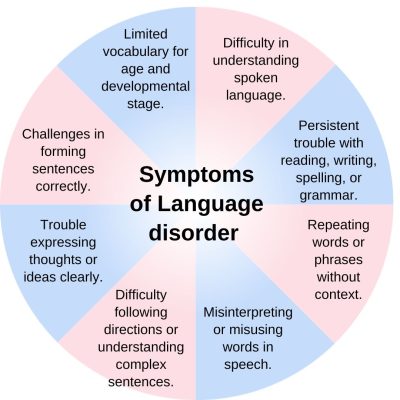
Tip for Parents: Even if your child meets some milestones but misses others, it’s worth checking with a pediatrician or speech-language pathologist. Many children with Speech Delay in Autism benefit greatly from early speech delay treatment combined with home-based activities and, in some cases, supportive homeopathy.
What Causes Speech Delays?
Speech delays are not caused by a single issue; often, they result from a combination of factors affecting how a child hears, processes, and produces language. Understanding the cause is key to choosing the right speech delay treatment.
Here are the most common reasons, explained in detail:
1. Hearing Problems
Even mild or temporary hearing loss—such as from repeated ear infections—can make it difficult for a child to clearly hear and copy sounds.
- If a child cannot hear “s” or “t” clearly, they may never practice saying them.
- Chronic middle ear fluid can reduce sound clarity, delaying both speech delay in autism and general speech development.
Tip: A simple hearing test by an audiologist can rule this out before starting therapy.
2. Oral-Motor Difficulties
Some children have difficulty coordinating the lips, tongue, and jaw to produce speech sounds.
- Weak oral muscles, low muscle tone, or restricted tongue movement (tongue-tie) can make speech unclear.
- Oral-motor planning issues (dyspraxia) cause trouble sequencing mouth movements for words.
In such cases, therapy may include muscle-strengthening exercises alongside speech delay treatment.
3. Autism Spectrum Disorder (ASD)
In autism and speech delay, speech differences are often linked to challenges in:
- Social engagement: reduced eye contact, fewer gestures, or less turn-taking.
- Language processing: difficulty understanding abstract concepts or multiple-step instructions.
- Preference for repetitive language: repeating lines from TV (echolalia) instead of generating new sentences.
In autism, language delay often coexists with sensory differences, making structured and individualized therapy crucial.
4. Developmental Language Disorder (DLD)
DLD is when a child struggles to understand or use language despite having otherwise typical development and hearing.
- They may have a limited vocabulary, difficulty forming sentences, or trouble remembering words.
- Unlike autism, social skills may be age-appropriate, but language challenges persist long-term without intervention.
5. Environmental Factors
The environment plays a big role in early language growth.
- Limited interaction: A child who has fewer face-to-face conversations may develop speech more slowly.
- Minimal language exposure: Children learn by hearing language in context; less exposure can slow vocabulary growth.
- High screen time: Excessive passive screen use can replace active communication opportunities.
For optimal development, children need responsive conversation, reading, and play daily.
6. Neurological or Medical Conditions
Certain medical issues can affect brain development and speech ability:
- Premature birth can delay overall developmental milestones.
- Brain injury, seizures, or neurological disorders may impair the areas of the brain responsible for language.
- Genetic conditions (e.g., Down syndrome, Fragile X syndrome) can affect speech clarity and timing.

How Are Speech Delays Diagnosed? (Step-by-Step)
Diagnosing a speech delay is not just about listening to how a child talks—it’s a structured process that looks at hearing, language understanding, communication style, and developmental history. This helps determine whether it’s a speech delay vs autism, a language disorder, or part of another condition.
Here’s how the process usually works:
Step 1: Parent Observation
Parents are the first to notice early speech delay symptoms—such as fewer words, unclear speech, or lack of imitation.
- Keep a speech diary: Note new words, sounds, gestures, and any regressions.
- Record short videos: They help professionals see real-life examples of your child’s communication.
- Pay attention to social engagement: Does your child look at you when you talk? Do they use gestures or facial expressions? This helps in identifying autism and speech delay patterns.
Step 2: Pediatric Screening
Your pediatrician will:
- Check developmental milestones for speech, motor, and social skills.
- Ask about pregnancy/birth history, hearing concerns, and family history of speech delays.
- Use simple screening tools to identify potential risks for speech delay in autism.
If delays are found, they may refer you to an audiologist, speech-language pathologist, or developmental specialist.
Step 3: Hearing Assessment
Hearing is the foundation of speech development. Even mild hearing loss can impact sound recognition.
- An audiologist uses tests like Otoacoustic Emissions (OAE) or Auditory Brainstem Response (ABR) to check hearing accuracy.
- This step ensures the child can hear all the speech sounds needed for proper language learning. If hearing loss is present, treating it can dramatically improve speech outcomes.
Step 4: Speech-Language Pathology (SLP) Evaluation
The SLP conducts a detailed assessment, which may include:
- Articulation testing: How clearly the child can make speech sounds.
- Receptive language: Understanding words, questions, and instructions.
- Expressive language: Using words, phrases, and sentences to express thoughts.
- Social communication: Eye contact, turn-taking, and conversational skills (important for identifying speech delay vs autism). The SLP then shares a written report with recommendations for speech delay treatment.
Step 5: Autism Assessment (if needed)
If social-communication differences, repetitive behaviors, or sensory sensitivities are present, a developmental pediatrician or psychologist may conduct:
- ADOS-2 (Autism Diagnostic Observation Schedule)
- CARS (Childhood Autism Rating Scale)
- Parent interviews and observation sessions
This helps clarify whether the delay is part of autism and speech delay or a standalone speech/language issue.
Step 6: Intervention Plan
Speech therapy sessions (usually 1–3 times per week). Home practice routines tailored to your child’s needs. Supportive therapies like occupational therapy for sensory integration, or homeopathy for overall well-being. A well-rounded plan ensures the child gets the right help at the right time.
Homeopathy Treatment for Speech Delays (Supportive & Individualized)
At Fidicus Autism, homeopathy is used as a complement to evidence-based speech therapy. While there is no one-size-fits-all cure, homeopathy focuses on improving the child’s overall well-being, which can support learning and therapy engagement.
Our Approach:
- Comprehensive Case-Taking
Understanding the child’s complete history—birth, development, personality, sleep, digestion, sensory patterns. - Individual Remedy Selection
Remedies are chosen for the child’s unique symptoms, temperament, and triggers. - Therapy Coordination
Homeopathy works alongside speech therapy to improve attention, reduce irritability, and support emotional balance. - Parent Training
Guidance on communication-building activities at home—parallel talk, expansion, choices, and structured play. - Monitoring & Adjustments
Regular follow-ups track new sounds, vocabulary, and overall progress.
Home tips for speech development:
- Model speech during everyday routines (“We are cutting apples. Cut, cut, cut!”)
- Give choices to encourage verbal responses
- Use repetition—children learn through hearing the same words often
Limit passive screen time; focus on active, face-to-face interaction

Final Thoughts
Speech delays can be a standalone challenge or part of a broader developmental condition like autism. The earlier you seek help, the better the outcome. A clear diagnosis helps you understand whether it’s speech delay vs autism and what therapies are best. At Fidicus Autism, we believe in combining professional speech delay treatment with natural, individualized homeopathy to address the whole child—body, mind, and communication skills.
If you suspect Speech Delay in Autism, book a screening with us today to start your child on the path to better communication and confidence.

